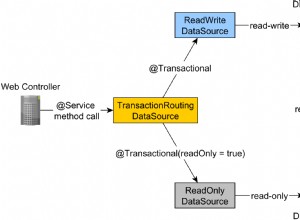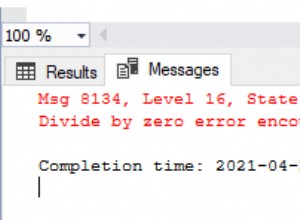Spróbuj tego:
CREATE OR REPLACE FUNCTION myFunc02()
RETURNS TABLE (like mysales) AS
$$
rv = plpy.execute('SELECT * FROM mysales ORDER BY id;', 5)
d = rv.nrows()
return rv[0:d]
$$ LANGUAGE 'plpythonu';
co zwraca:
gpadmin=# SELECT * FROM myFunc02();
id | year | qtr | day | region
----+------+-----+-----+---------------
1 | 2014 | 1 | 1 | north america
2 | 2002 | 2 | 2 | europe
3 | 2014 | 3 | 3 | asia
4 | 2010 | 4 | 4 | north-america
5 | 2014 | 1 | 5 | europe
(5 rows)
Coś do rozważenia dla MPP, takich jak Greenplum i HAWQ, to dążenie do funkcji, które przyjmują dane jako argument i zwracają wynik, zamiast tworzyć dane w samej funkcji. Ten sam kod jest wykonywany w każdym segmencie, więc czasami mogą wystąpić niezamierzone skutki uboczne.
Aktualizacja dla SETOF wariant:
CREATE TYPE myType AS (id integer, x integer, y integer, s text);
CREATE OR REPLACE FUNCTION myFunc02a()
RETURNS SETOF myType AS
$$
# column names of myType ['id', 'x', 'y', 's']
rv = plpy.execute("SELECT id, year as x, qtr as y, region as s FROM mysales ORDER BY id", 5)
d = rv.nrows()
return rv[0:d]
$$ LANGUAGE 'plpythonu';
Uwaga, aby użyć tych samych danych z oryginalnego przykładu, musiałem aliasować każdą kolumnę do odpowiadających im nazw w myType . Ponadto będziesz musiał wyliczyć wszystkie kolumny mysales jeśli idziesz tą drogą - nie ma prostego sposobu na CREATE TYPE foo LIKE tableBar chociaż możesz użyć tego, aby złagodzić część ręcznej pracy polegającej na wyliczeniu wszystkich nazw/typów:
select string_agg(t.attname || ' ' || t.format_type || ', ') as columns from
(
SELECT a.attname,
pg_catalog.format_type(a.atttypid, a.atttypmod),
(SELECT substring(pg_catalog.pg_get_expr(d.adbin, d.adrelid) for 128)
FROM pg_catalog.pg_attrdef d
WHERE d.adrelid = a.attrelid AND d.adnum = a.attnum AND a.atthasdef),
a.attnotnull, a.attnum,
a.attstorage ,
pg_catalog.col_description(a.attrelid, a.attnum)
FROM pg_catalog.pg_attribute a
LEFT OUTER JOIN pg_catalog.pg_attribute_encoding e
ON e.attrelid = a .attrelid AND e.attnum = a.attnum
WHERE a.attrelid = (SELECT oid FROM pg_class WHERE relname = 'mysales') AND a.attnum > 0 AND NOT a.attisdropped
ORDER BY a.attnum
) t ;
co zwraca:
kolumny columns
-------------------------------------------------------------------
id integer, year integer, qtr integer, day integer, region text,
(1 row)




